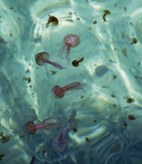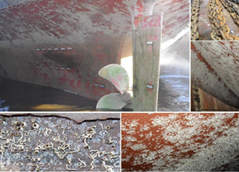ENVIRONMENTAL PROTECTION
Environmental Protection
In pursuance of its policy on the management of safety, quality, energy saving and environmental protection, NMB is committed to provide services in a manner causing the least possible adverse environmental impacts. For the fulfilment of this commitment NMB has developed and effectively implements a series of plans and measures to monitor, control, manage, and minimize the adverse impact that our activities and operated by us ships make on the environment.Reduce the transfer of invasive aquatic species
The transfer of invasive aquatic species from one area to another through shipping is considered to be one of the greatest hazards to the marine environment and the threats facing the planet. The ballast water exchange and biofouling on the ship's hull may result in the establishment of invasive aquatic species which may pose threats to human, animal and plant life, economic and cultural activities and the aquatic environment.. To minimize the risk of spreading of harmful marine organisms, we apply the following measures:
- for the management of ballast operations - for each ship operated by NMB there is a developed ship specific plan for the management of ballast water and this plan is consistent with the applicable IMO requirements and with all applicable rules and requirements of the local authorities of the visited ports and territorial waters of the countries in which vessels navigate. The precise execution of the plan for the management of ballast water on any particular ship is the key for minimising the risk of adverse environmental impact.

- to control biofouling of ship's hull – for every ship operated by NMB there is a ship specific Plan to control biofouling, developed in full compliance with the recommendations of the Resolution MEPC. 207 (62)-2011 Guidelines for the Control and Management of Ships' Biofouling to Minimize the Transfer of Invasive Aquatic Species. The planned activities related to the control of biofouling of the hull of the ships operated by NMB, are not only limited to clean the hull and installation of conventional antifouling systems during ship dry-docking. Underwater hull inspections and cleaning practices are established and carried out during the ship operation between two consecutive dry-docking.
The preservation of marine species

Ships collision with marine mammals such as whales and manatees (sea cows) causes injury which often ends fatally for these animals. The biggest threat to North Atlantic Right Whales, one of the most endangered marine species (with not more than 400 in number), is to be hit by a ship. To minimize the risk of collision with marine mammals, the ships operated by NMB strictly comply with the requirements of the American National Oceanic and Atmospheric Administration for planning voyages and navigate with reduced speed in the areas inhabited by the North Atlantic Right Whales.
Reducing the consumption of natural resources and atmosphere pollution prevention
 The fuel consumption is an essential element of the performance of the transport service for the carriage of goods by sea. On one hand, the consumption of fossil fuels affects the depletion of natural resources, and on the other hand the marine engines’ exhaust gases are a significant source of pollution of the atmosphere. In order to reduce the emission of greenhouse gases and sulphur oxides to the atmosphere and to optimize the fuel consumption there is developed and implemented a system in NMB for the management of energy efficiency, taking into account the specific characters of each particular vessel. The control of this process is fully automated as the base data for quantity of fuel consumed for transport of cargo on a particular route the amount of CO2 emissions from each ship is calculated through a special software product internally developed in compliance with the high goals and standards set across the organization.
In addition to the above NMB has developed software for strict control over the consumption of technical gases and chemicals on board operated ships.
The fuel consumption is an essential element of the performance of the transport service for the carriage of goods by sea. On one hand, the consumption of fossil fuels affects the depletion of natural resources, and on the other hand the marine engines’ exhaust gases are a significant source of pollution of the atmosphere. In order to reduce the emission of greenhouse gases and sulphur oxides to the atmosphere and to optimize the fuel consumption there is developed and implemented a system in NMB for the management of energy efficiency, taking into account the specific characters of each particular vessel. The control of this process is fully automated as the base data for quantity of fuel consumed for transport of cargo on a particular route the amount of CO2 emissions from each ship is calculated through a special software product internally developed in compliance with the high goals and standards set across the organization.
In addition to the above NMB has developed software for strict control over the consumption of technical gases and chemicals on board operated ships.
Management of garbage generated on board ships operated by NMB
 Oh the 15th of July 2011 the International Maritime Organisation (IMO) adopted resolution MEPC. 201 (62), amending Annex V of the International Convention of 1973 for the prevention of pollution from ships, as modified by the Protocol of 1978. The amended Annex V of MARPOL 73/78 turns historical presumption that garbage is allowed to be discharged in the sea, depending on the origin of the waste, and certain distances from shore. Under the amended Annex V of MARPOL 73/78, the disposal of any garbage at sea is now prohibited, unless explicitly allowed under strict conditions. Shipboard generated garbage is discharged to port reception facilities. In order to reduce the quantity/volume of generated garbage on board ships operated by NMB a wide range of techniques are applied:
Oh the 15th of July 2011 the International Maritime Organisation (IMO) adopted resolution MEPC. 201 (62), amending Annex V of the International Convention of 1973 for the prevention of pollution from ships, as modified by the Protocol of 1978. The amended Annex V of MARPOL 73/78 turns historical presumption that garbage is allowed to be discharged in the sea, depending on the origin of the waste, and certain distances from shore. Under the amended Annex V of MARPOL 73/78, the disposal of any garbage at sea is now prohibited, unless explicitly allowed under strict conditions. Shipboard generated garbage is discharged to port reception facilities. In order to reduce the quantity/volume of generated garbage on board ships operated by NMB a wide range of techniques are applied:
- measures to reduce the amount of generated garbage in place of its origin;
- treatment of the garbage onboard by incineration, pressing or grinding;
- A second/alternative use of garbage generated by an activity in the same or other activity on board;
- Separate collection and storage of garbage, taking into account the applicable local rules at the port of discharge, separating those that can be used as secondary raw material for further processing and utilization.

Protecting the sea from petroleum products pollution
The most common cause of petroleum products pollution by ships comes from what are called operational oil spills. These are caused mostly by human error and have a devastating effect to the environment. Therefore, this problem is given considerable attention in the implemented in NMB SQMS. After the completion of thorough risk assessment respective procedures and checklists have been developed and approved by classification societies plans for all marine operations where a risk of an oil spill exists. NMB has contracted reputable organizations for dealing with oil spills, rescue and firefighting at sea for action in the event of a real danger of an oil spill.Protecting the sea from pollution during carriage of dangerous goods (harmful to the marine environment)
in addition to compliance with international requirements related to the transportation of solid bulk cargoes hazardous to the marine environment NMB introduced and implemented a number of additional measures aimed at environment protection. Measures for the protection against pollution with hazardous to the marine environment cargoes are applied both during loading and discharging operations and during carriage by sea in close cooperation with port authorities, operators of reception facilities in ports and NMB partners.NMB has developed software for monitoring of types and quantities of ships’ generated garbage and sludge. This software facilitates analysis of the accumulated in this respect data.
The constant improvement of the SQMS effectiveness aiming to achieve higher standards in safe, environmental friendly and quality transport services is of paramount importance for NMB. The above mentioned commitment and activities as well as the NMB Environmental Management System are certified by RINA in compliance with the ISO 14001.

